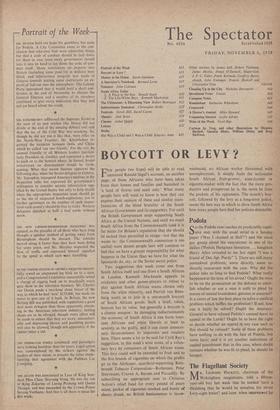BOYCOTT OR LEVY
FEW people (we hope) will be able to read unmoved Ronald Segal's account, on another page, of those Africans who have been taken from their homes and families and banished to 'a land of thorns and sand only.' What many people here will want to know is how they can express their opinion of these and similar mani- festations of the blind brutality' of the South African Government and its supporters. For until the British Government stops supporting South Africa at the United Nations, and until we expel South Africa from the Commonwealth (and it is far better for Britain's reputation that she should be sacked than permitted to resign—not that she wants to: the Commonwealth connection is too useful) most decent people here will continue to feel that we have a greater responsibility for what happens in the Union than we have for what the Spaniards do, say, or the Soviet secret police.
Two suggestions this week come one from South Africa itself and one from a South African in London. Kenneth Mackenzie appeals to cricketers and other games-players to refuse to play against South African teams chosen only from the white minority, and Patrick van Rens- burg wants us to join in a one-month boycott of South African goods. Such a brief, token, boycott has its value, but generally a boycott is a clumsy weapon : by damaging indiscriminately the economy of South Africa it can harm inno- cent Africans and white liberals at least as severely as the guilty, and it can cause unneces- sary inconvenience to importers and retailers here. There seems a lot to be said for Cyril Ray's suggestion, in this week's wine notes, of a volun- tary levy by consumers of South African wines. This levy could well be extended to fruit and to the five brands of cigarettes on which the profits go to the Afrikaner, apartheid-supporting Rem- brandt Tobacco Corporation—Rothmans, Peter Stuyvesant, Craven A, Barons and Piccadilly. By subscribing an appropriate sum to Christian Action's relief fund for every pound of pears eaten, packet of cigarettes smoked and bottle of sherry drunk, no British businessman is incon- venienced, no African worker threatened v unemployment. It simply faces the nations South African fruit-grower, wine-farmer cigarette-maker with the fact that the more r ductive and prosperous he is, the more he li the pockets of his opponents. The month's b colt, followed by the levy as a long-term poll seems the best way in which to show South MI how many people here find her policies detestal tith Hat or ro- nes oy- icy, ica le.






































 Previous page
Previous page